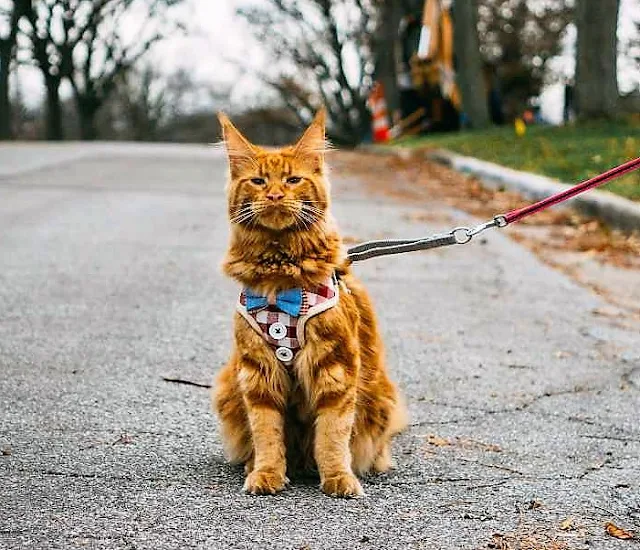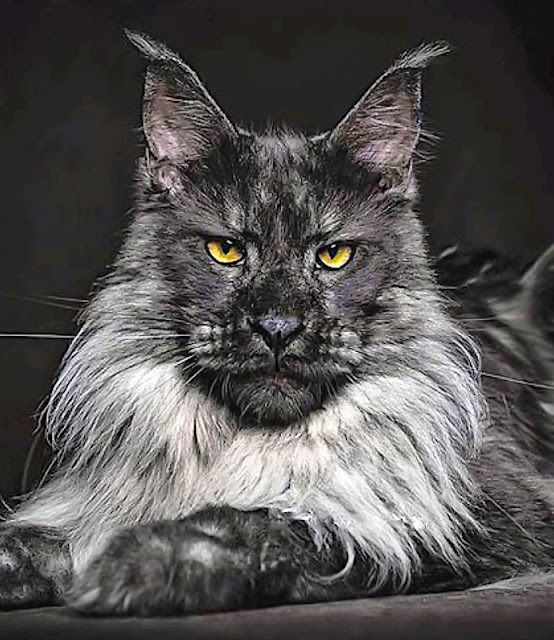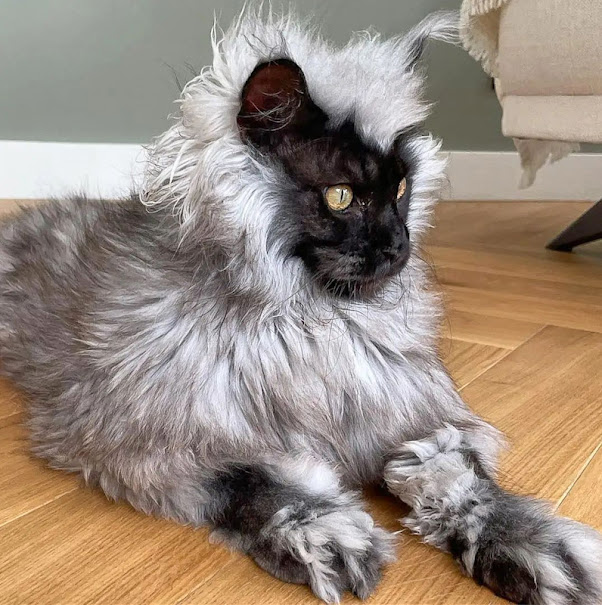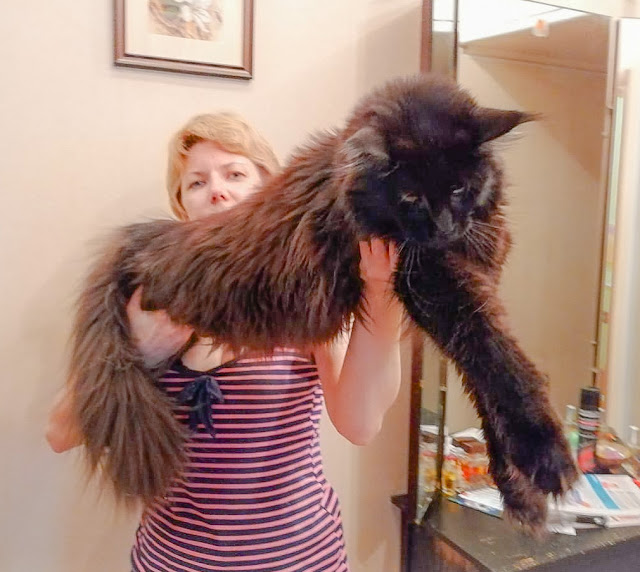What do you need to do to buy a Maine Coon cat?
This is a long page to try and make it fairly comprehensive. Starting from scratch, what does a person need to do to buy a Maine Coon cat? Obviously, you've got to approach a cat breeder because on nearly every occasion, you will have to buy your Maine Coon cat from a cat breeder. Rarely there are rescue Maine Coons. Although it is worth checking out the rescue Maine Coon route. But what do you do before that?
Ready to buy a cat?
I think that you must go back to square one first. At the beginning of a decision to buy a Maine Coon cat you have to consider domestic cats generally by which I mean: "Are you in a position to adopt a domestic cat?". "Are you in a position to live with a domestic cat for the lifespan of the cat?" It is a fundamental question which applies to every domestic cat whether they are non-purebred or purebred.
In fact, the question is more appropriate or more pointed in respect of the Maine Coon cat because when you adopt a Maine Coon cat you are taking on a greater responsibility then you would if you were adopting a random-bred or moggy. I'll explain what I mean a bit later in this article.
So, the first question is whether the person has enough disposable income to buy a Maine Coon cat. You'll see lots of articles about the cost of keeping domestic cats. The classic general cost would be around £15,000 over the lifetime of the cat presuming that they live to around the age of 15 and are reasonably healthy. This is maintenance to which you have to add the purchase price at around $1,200 which is at the cheap end.
In the US you may pay $3,500 for European-style Maine Coons bred in Washington. They are more expensive because they are more extreme and extreme is the vogue because all we see on the internet is extreme Maine Coons.
If that figure is correct and it is ballpark correct, this is about £1000 a year for maintenance or about $1200 per year roughly. So, you've got to have around £1000 disposable income i.e. free money. This is money which you are now saving and not spending. Or you've got to cut back on something else to free up that £1000 per year.
That is quite a tough question for a lot of people. Particularly in the UK where there is a cost-of-living crisis and high inflation at the moment. Really, this question is about giving up something in order to take advantage of the benefits of living with a Maine Coon cat. It is a bit of a trade-off. You don't get the benefit of living with a domestic cat for free.
There are responsibilities and they are quite big actually such as a loss of some freedoms. The first responsibility concerns money and spending it.
Purebred or random bred?
You have got the money so it is worthwhile at least briefly checking that you really do want to adopt a Maine Coon cat rather than a beautiful random bred domestic cat from a rescue center. Just tick that box, I would. Because you will do a lot of good in rescuing a domestic cat from a rescue center. You will give them a home whereas if you buy from a cat breeder you are in a small way doing something which has a negative impact upon the adoption of rescue cats.
Lifestyle
The next question which runs in parallel with the budget question is whether you have the lifestyle to genuinely provide a proper caregiving service to a Maine Coon cat. That means a stable lifestyle. It means a stable work environment whereby you can have enough time at home to provide company to your cat.
This is a major issue for me but other people will have different opinions. But the point is this: you will probably have to keep your Maine Coon cat indoors for their safety because they are too valuable and too attractive to go outside on their own unsupervised at will.
And therefore, if you're working from dawn till dusk your Maine Coon cat will be stuck in your home by themselves all day every day. That, to me, does not sound like a good idea as it is liable to lead to stress in the cat with consequential health issues at least potentially.
Of course, I'm talking about a person living alone. If somebody is in the home while the owner or part-owner is away at work then that's fine. That box is ticked. The point is that the cat has to have companionship throughout the day at some time. That's part of the lifestyle arrangement.
And, incidentally, I don't think that getting a second cat to keep a Maine Coon cat company is an adequate substitute for the human caregiver being around for a large part of the day. Firstly, it is difficult to ensure that two cats get along in a very friendly way all the time.
Secondly although a second cat can entertain the resident cat there is no real substitute for the presence of the human companion. This is a matter for the caregiver to decide on but ultimately, I think the caregiver should be around or a caregiver should be around for a substantial part of the day as mentioned.
And then, of course, there is the accommodation. Do you live in an apartment or in a house? If it's a house, is it on a main road? Do you live in a quiet area or noisy area. Is there a back garden or not?
 |
| Image in public domain. |
I think the ideal arrangement for a Maine Coon cat would be living in a home with a moderately-sized garden and around the garden is a fence which keeps the cat inside the garden. You can buy them in the UK and in the USA. This is an added expense. Such a fence might cost a few thousand pounds or more. That expense needs to be added onto the £15,000 I've just mentioned.
Or a catio can be built as an attachment to the home. Yes, these are all added expenses to do with lifestyle and accommodation. And I am looking at something more than the basics. I am looking at something which is a little bit better than the basic requirements and they all cost money.
But the bottom line is that it should be a home of reasonable size with a person who is there most of the time and ideally a space outside which is secure for the cat to move around in and which keeps them captive within that space.
Environmental enrichment
I have written about this before obviously. But because the Maine Coon cat is going to be a full-time indoor cat, the indoors needs to be environmentally enriched to stimulate the cat. To allow them to express their natural behaviours which means climbing.
 |
| Catio enriches the Maine Coon environment. Image in public domain. |
It means plenty of playtime with the cat. There are things to do in this regard. Not many people actually modify the interior of their home to accommodate the needs of a domestic cat as much as it accommodates the needs of a human being! The objective will be to treat each equally in terms of the environment. That is a tall order and very, very few people including me meet that objective.
Another way to mentally stimulating making cat is to least train them when they are kittens ideally and then take them out for short walks on a lead. This provides them with all the stimulation that the outdoors can bring and makes the environment much less sterile and boring. That requires quite a lot of input from the human caregiver to get right.
RELATED: Strong trend in Australia to keep domestic cats inside full-time has a big DEFECT.
Domestic cats, as you might imagine, do not take to a lead very well. They are not like domestic dogs in this regard. They tend to flop or fall over and certainly they don't follow on the lead but they can be trained like dogs although it might take a little longer.
Food
At a fundamental level, the food requirements for a Maine Coon cat are identical to those of any other domestic cat. I am adding this for the sake of completeness. Only the food will cost around 1.5 to 2 times the normal as your cat is up to twice as large. I estimated that feeding a top-quality wet diet might cost around $4,000 pa!! Read about it by clicking on this link.
Health
A buyer of a Maine Coon cat must be aware that this wonderful cat breed can and does inherit a series of genetic diseases including hypertrophic cardiomyopathy, hip dysplasia, patella luxation, and spinal atrophy to name the major ones.
RELATED: Why should you buy a Maine Coon cat?
This means health problems and sometimes they can occur quite young in life. This means the caregiver needs to question whether they should take out a pet health insurance policy or at least put aside say £50 or $50 per month to run their own pet health insurance policy.
%20(1).png) |
| Image in public domain. Indicating genetic inheritance of certain illnesses. |
That money should be ring fenced to be spent on the health of their cat only. But obviously the cost of caregiving goes up if you take out an insurance policy. The top end insurance policies for Maine Coon cats will be quite expensive, something akin to another mortgage!
RELATED: Why shouldn't you buy a Maine Coon cat?
Buying the cat
The basic method of buying a purebred cat is to choose a breeder who has a reputation for quality and integrity, meet that breeder, discuss the matter with the breeder, select your kitten at the breeder and then you hand over the money with all the requisite paperwork.
The universal advice is not to buy online unseen. I do not think that it is wise in any way to buy a Maine Coon cat online and pay a deposit online without seeing the cat in person or the breeder in person. I just don't think you can buy a sentient being in that way and you certainly can't check out the breeder.
 |
| Image: MikeB |
The point is this: you need to make sure that the cat you are buying is a genuine Maine Coon cat and not a Maine Coon-mix or even a moggy. You need the genuine article and you can only reassure yourself of that by seeing a documented lineage or pedigree of the individual cat in question which tells you that they are purebred because going back through the lineage you will see that their parents and grandparents and great grandparents are all purebred cats registered with a cat Association.
You must see this and you must see a contract and documents relating to the health certificates and vaccinations et cetera. There is quite a lot to think about but the paperwork is very important.
After all, you are buying a purebred cat. You simply must get that bit right because that is wrong everything falls with it. It's all pointless if you objective is to buy a beautiful Maine Coon cat.
Selecting a suitable breeder might start with a cat association such as the Cat Fanciers' Association in the USA or the Governing Council of the Cat Fancy in the UK. They do have contact with their members and sometimes they supply lists of breeders.
But they do specify that they can't vouch for the quality of the breeder if they provide a list of breeders on their website. The cat associations are one aspect of selecting a breeder. You might be able to find one online and social media for instance and you might find some reviews on Google or other sources such as forums which can recommend a certain breeder.
A simple searching Google of the breeder's name may throw up some unforeseen issues which may help you to make a selection.
Contract
I can quickly touch on the contract again. The contract is useful in order to keep both parties to their agreement which states that the adopter pays for the cat and the breeder sells the cat. Each party has an obligation to comply with the contract. You won't know whether they will comply with the contract until it has played out for a few months after the purchase i.e. with regard to unforeseen health issues.
So, if things go wrong, you can then return the cat if the contract allows that. And the contract should allow a return of the cat if the cat is unhealthy or the breeder has not complied with the basic requirements regarding health such as vaccination and certificates regarding freedom from HCM and any other inherited disease that is relevant to this breed.











Comments
Post a Comment
Please share your Maine Coon experiences.